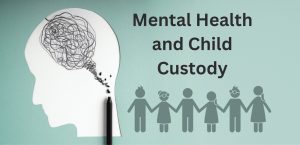 Mental health issues can impact every area of a person’s life, and if not managed properly can have devastating effects on that person and all of their relationships, including their marriage or romantic relationship, which can lead to mental health and child custody issues.
Mental health issues can impact every area of a person’s life, and if not managed properly can have devastating effects on that person and all of their relationships, including their marriage or romantic relationship, which can lead to mental health and child custody issues.
Mental illness in divorce cases and mental health issues in family law become the primary focus when custody and parenting time must be resolved. Likewise, when parents work to reach an out of court settlement and custody and parenting time must be agreed upon, the mental health of the parents is a priority.
Both custody and parenting time will involve a determination that both parents are suitable and able to care for the children. When parents are mentally unfit, or it is proven that one parent is mentally unstable when the court is addressing mental health and child custody issues, it can be determined that the parent should have limited custody and parenting time with their children.
As a matter of public policy in New Jersey, courts encourage parents to share joint legal custody. Even in situations where it may be determined that one parent should not have custody of the child, a relationship between that parent and the child or children is still encouraged, and that parent typically has a right to at least exercise parenting time in some capacity, such as when one parent is incarcerated or struggles with addiction issues. When one parent may be mentally unfit, it does not automatically terminate that parent’s parental rights.
How to prove mental illness in custody case
Mental health issues can take many forms. Often people want to know how to prove a parent is mentally unstable. Parents with mental illness and child custody issues are generally evaluated by an independent third-party to facilitate the court’s decision making process. This mental health expert can evaluate the parent to make a recommendation to the parties, their attorneys and the court, as to the parent’s fitness. It is not sufficient to accuse a person of being mentally unfit. Documented support is necessary in these situations.
Can I lose custody for depression and anxiety?
People often want to know if they can lose custody of their children due to depression and anxiety. Plenty of people are functioning, productive members of society, who may also struggle with anxiety and depression, not unlike other illnesses. Mental health issues can be managed through the help of therapy, medication, and other forms of treatment. When the court is called upon to make decisions, when a custody agreement is not in place, the primary concern is always the best interests of the child, and whether or not that parent negatively impacted the child in some way.
Every case is completely different, because mental health issues can encompass many different circumstances, if you are going through a divorce where you are dealing with mental health and family law issues it is important for you to understand that having a mental illness does not alone, determine that one parent should not have parenting time or custody rights with their children. The severity of that person’s mental illness, and whether or not their situation can be managed and what arrangement is best for the children will always be the priority.
It is always helpful to seek out other professionals when dealing with divorce situation’s in addition to an attorney. If you are dealing with family law and mental health matters, and are concerned about dealing with custody issues contact DeTorres & DeGeorge today. We are prepared to help you navigate this difficult time in your life to ensure that you have the resources that you need to deal with mental health issues in family law matters. Contact our office today for a consultation.

 START LIVE CHAT
START LIVE CHAT









